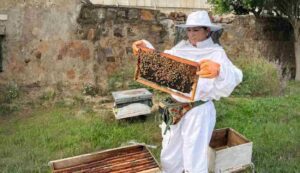Success Story: Neha Luke left her corporate job and started organic farming, earns lakhs annually
Success Story: Neha Luke is from Ambala, Haryana, and her life narrative is about changing one’s side with honesty, purpose, and genuine determination rather than about arriving at an unknowable goal. For twenty years, Neha Luke established a prosperous career at a reputable financial firm. Her spouse was employed in the corporate finance industry as well. However, underneath their dazzling careers was a common dream: a life entwined with the natural world, wildlife, and the simplicity of the hamlet.

The foundations of their existence were rocked in 2020 when the corona epidemic swept the globe. During this period, Neha’s family also experienced the trauma of job loss. However, they saw it as a fresh opportunity to rediscover who they were and what their true mission was, rather than as a failure. They bravely and firmly said farewell to the corporate world and put all of their money into a worthwhile and long-lasting project.
This vision evolved into Mala Farms, which Neha named after her late mother, “Mala”—a name that represents the village’s simplicity, purity, and spiritual ties. Neha’s early recollections center on her time spent growing vegetables in the garden with her mother. Mala Farms pays homage to her mom.
With merely two acres of land close to Gurugram, our adventure began on August 15, 2021. However, Mala Farms, which spans more than 50 acres, is now a prosperous organic, sustainable, and integrated agricultural model. It is now more than simply a farm; it is a symbol of perseverance, determination, and the strength of beginning again.
In addition to gardening, Neha enjoys interacting with others and imparting information. She just joined Krishi Jagran’s Global Farmer Business Network (GFBN), an initiative that strives to turn farmers into prosperous agri-entrepreneurs and self-sufficient individuals.
A whole ecosystem, with crops, bees, chickens, goats, and cows
Mala Farms is a way of life, not merely a location to raise food. Living in peace with nature, where each animal, plant, and person benefits the ecosystem, is the farm’s unique concept.
More than 25 Gir breed cows, which are prized for their A2 milk, are kept on the farm. These native cows, which provide milk, curd, ghee, and buttermilk, are the backbone of Mala Farms’ dairy operations. The couple’s dedication to protecting the native breeds is shown by the Haryanvi cows who accompany them.
Dairy is just one part of the farm, however. Additionally, it raises around 60 native goats that are acclimated to Haryana’s environment. In addition to producing milk and meat, these goats also contribute to the fields’ increased fertility via their excrement.
More than 700 native hens, including varieties like Rhode Island Red and Kadaknath, are kept at Mala Farms. These birds are all fed on a natural diet and are allowed to wander freely. In addition to these, the farm has geese, ducks, and turkeys. In the fields, geese and turkeys also serve as pest killers.
The two horses—a mother and her child—that the couple has rescued are a perfect example of beauty and compassion. They now live in harmony at Mala Farms and are a reflection of the farm’s kindness and caring.
In addition to the animals, the farm is home to over 700 beehives, which are crucial for pollination and produce raw honey. The whole system operates as a self-sufficient, autonomous, and balanced farm, serving as a real-life illustration of how farming may coexist peacefully with the environment.
A market for wholesome and trustworthy food
The goods from Mala Farms are as diverse as they are organic and clean. A2 milk, paneer, buttermilk, goat milk, raw honey, desi ghee, open-farmed desi chicken meat, and desi eggs are a few of their distinctive items. These goods are all manufactured without the use of artificial additives, chemicals, or antibiotics.
They grow an ancient, low-gluten kind of wheat called Khapli wheat, or Emmer wheat. To guarantee that its nutrients are completely intact, it is hand-husked and cultivated using conventional techniques.
In a wooden ghani, mustard oil is extracted by cold pressing, preserving its inherent qualities and fragrance. These durable goods, including ghee, honey, khapli wheat, and yellow mustard oil, are now sold on well-known internet marketplaces like Amazon.
In the Delhi-NCR area, Neha and her colleagues transport perishable goods, including milk, eggs, and vegetables, to preserve freshness.
In order to expedite the delivery of fresh farm items to consumers’ homes, Mala Farms plans to launch a rapid delivery service (rapid Commerce) starting next month. Only products with a long shelf life, such as ghee, mustard oil, honey, and khapli wheat, will be sold on the internet platform.
This strategy is developing a market for food items that are dependable and sanitary for healthy living as well as for eating.
Enhancing rural living and empowering women
In addition to farming, Mala Farms has developed into a potent platform for empowering women to become independent. Rural women are being educated to manage beehives in their homes as part of Neha’s women-led beekeeping initiative. After giving them boxes and bees, Neha purchases the honey that is harvested from them. This allows the ladies to earn money on a consistent basis without interfering with their domestic duties.
Under this paradigm, over 500 beehives have been constructed so far. One beehive at a time, this program has changed the lives of hundreds of women by giving them confidence, expertise, and dignity.
A leader who has a clear vision
According to Neha, farming is the future rather than a backup plan. In the realm of agri-entrepreneurship, she is encouraging women in particular to become independent via webinars, seminars, and field-based training. She wants farming to be understood, embraced, and believed in by the younger generation.
Obstacles and lessons learned
Neha acknowledges that farming is a difficult profession. It calls for self-control, perseverance, and physical exertion. Crops don’t wait for holidays, and animals need care around the clock. She has often dealt with illnesses, limited rainfall, and supply chain issues.
But she learned something new from every obstacle. Neha often remarks, “Farming is very difficult, despite the fact that it is frequently depicted as lovely and straightforward. There are never any days off, and it demands whole dedication—living it.”
A developing dream
Mala Farms is situated near Raisina Village, Gurgaon, on Acreage 23. It is much more than simply a farm; it is a dynamic illustration of inclusive, profitable, and regenerative agriculture. Neha’s next objectives are to develop a small processing facility, boost conventional grain yields, and ultimately open a farm school to educate kids about actual farming.
Neha’s message is clear as Mala Farms enters the age of quick commerce and broadens its internet presence: farming that saves lives, success that can be shared with everyone, and food that nourishes.

